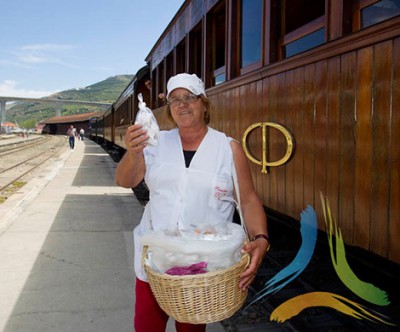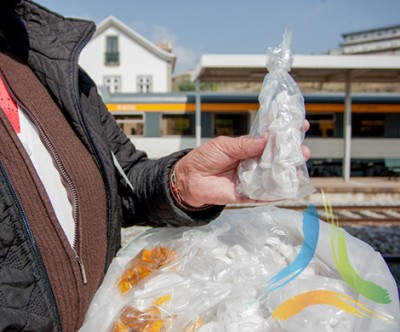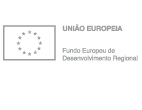Régua boiled sweets: treacle wraps
Add MyTrip



41.15804313970536
-7.783341074035661
Régua boiled sweets: treacle wraps
It is not known whether they arrived with the train, in 1879, or as a result of it. What is known is that to this day the railway station at Régua sees its sweets go past in the sweet makers’ baskets. For their high spirits...
Presentation
It is not known whether they arrived with the train, in 1879, or as a result of it. What is known is that to this day the railway station at Régua sees its sweets go past in the sweet makers’ baskets. For their high spirits and the strength of their street cries, these women seem to take life in a sweet note.
They’re ladies in white smocks, matching scarf and a shoulder basket that upholds a tradition which blends with the Douro itself. With varying ages, the 14 sweet makers started this activity for money and the will to preserve something they’re very proud of.
Dona Alcina is 83 and is the oldest of them. Sónia Tavares, at 33, is the youngest. Half a century separates them, but a powerful tradition unites them. In their hands, they carry small 9-unit bags which they sell for 1 euro in the station square.
Sónia Tavares has been doing this since she was 16. She learned her trade from her elders, from the recipe to the street cries that attract the visitors to the city. The young sweet maker confirms that they all took this up following in the footsteps of their family ancestors. It’s a sort of legacy passed on to them at birth, the passing of a sugary baton.
There are records attesting to the existence of four girls in green smocks who, from the 1940s, as trains came in, sold water in jugs, for 15 tostões, water in small pitchers (two tostões a glass), biscuits, fruit and the mythical Régua boiled sweets (three bags for five escudos).
Between hot and cold
The women make the sweets in the evening, since during the day they walk the station and accost the cars stopped in traffic to sell them.
To make these sweets, you put a pot with water, honey, lemon and sugar to heat. You leave this in the pot for about 30 or 40 minutes until it reaches sugar degree. The rest is a well-guarded secret and each sweet maker has her own.
After reaching the right degree, the cold marble slab is prepared. It is here that, after it has been greased with margarine, the thermal shock occurs. “You pour this hot paste from the pot onto the marble slab and, using a spatula, you twist the still hot sweet.” At this stage, it is important to keep stirring and take care to not let the sweet block cool down too much. “If this happens, the sweet may turn into glass and then you can’t cut it,” she explains.
Subsequently, callused hands separate it into small sweets. Normally, this is done with pruning shears, the same tool used for harvesting grapes in the Douro. After cutting, they wrap them in greaseproof paper until they get the shape of perfect bows.
Persuasive voices
A vantage point as the meeting place of those who arrive and depart Régua, the station gathers the sweet makers with the same aim: to sell as much as they can and, at the same time, carry along the line the typical flavour of this treat born in the heart of the Douro.
Who can remain indifferent to the street cries? Not even the tourists, who pretend to understand what is being said, can conceal brief smiles. “Get your Régua sweets here, take some sweets with you,” “Won’t you take a little bag, love?rdquo; can be heard over and over again.
The sweet makers can make about 200 sweets with just one kilo of sugar. Once the bags are completed, it’s time to go and sell them in the station, and surrender “to the hands of God”. “Here you work from Sunday to Sunday and on holidays too. We might sell two packets in one day, we might sell 10,” Sónia reveals.
These sweets can be savoured during the trip, but they also serve as a souvenir of Régua. Those who buy them at the station, eventually offer them at the place of destination. In May 2011, the Peso da Régua City Council registered the “Rebuçados da Régua” (Régua Sweets) brand officially to certify an exclusive product of the Douro city.
Sónia knows that she has already sold sweets that ended up in the four corners of the country and the world. Brazil, France, Belgium and Switzerland are some of the places where someone has taken delight in the unique flavour of this homemade treat that was originally sold in festivals and processions in the Douro.
Text: Patricia Posse | Daniel Faiões
Schedules/Prices
Contacts
Address
Largo da Estação
5050-273 Peso da Régua
Largo da Estação
5050-273 Peso da Régua
Latitude
41.15804313970536
41.15804313970536
Longitude
-7.783341074035661
-7.783341074035661












